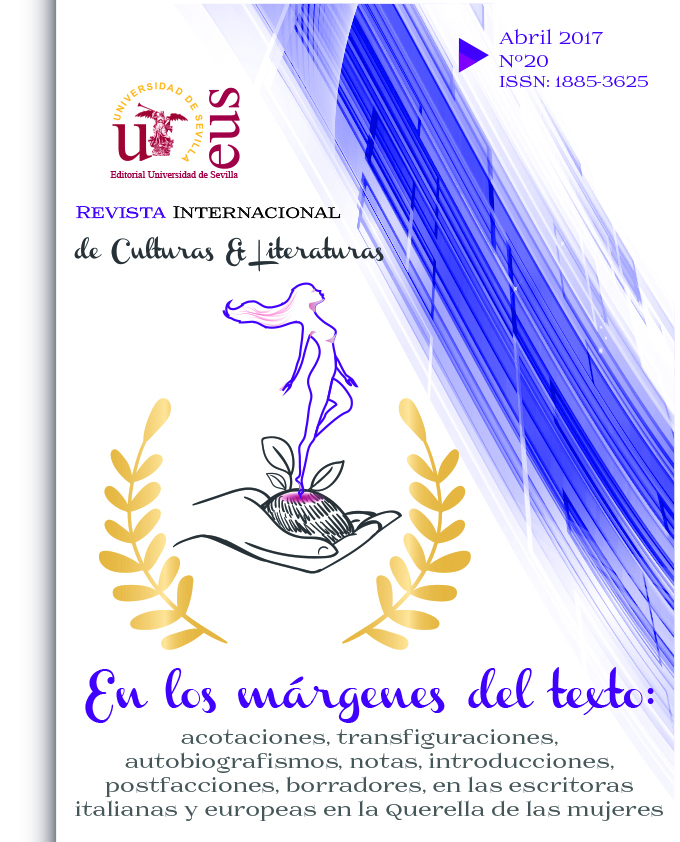MARIE DE GOURNAY Y RITA LEVI-MONTALCINI: LA QUERELLA DE LAS MUJERES EN UN TIEMPO DE CAMBIOS
DOI:
https://doi.org/10.12795/RICL.2017.i20.05Palabras clave:
memoria, igualdad, educación, escritura, pensamientoResumen
El propósito de este trabajo es subrayar la búsqueda de la identidad femenina a través de dos pensadoras que, separadas en el tiempo, coincidieron tanto en su lucha contra la misoginia de la ideología patriarcal, como en los métodos para expresar sus ideas. Marie de Gournay y Rita Levi-Montalcini parten de la genealogía femenina para entender el presente y proyectar el futuro. Ambas creyeron en la necesidad de transformar las superestructuras de la sociedad para potenciar la voz y la inteligencia de las mujeres. Y lo hicieron alejándose del dogmatismo, con coherencia, apelando al raciocinio y a la libertad interpretativa.
Abstract
The purpose of this paper is to underline the search for female identity through two thinkers separated in time, but in agreement in their struggle against patriarchal ideology, and mainly, on the method to express their thinking and their concept of feminine ancestor. Marie de Gournay and Rita Levi-Montalcini start from the female genealogy to understand the past and to project the future. Both of them believed in the necessity to transform the superstructures of society to enhance the intellectual capacity of women. And they did it because they were consistent with their ideas, moved away from dogmatism and called upon to reason and to interpretative freedom.
Descargas
Citas
Amorós, C., Tiempo de feminismo. Sobre feminismo, proyecto ilustrado y postmodernidad, Madrid, Cátedra, 2000, 2ªedición.
Borin, F., “Imágenes de mujeres” en Historia de las mujeres 3. Del Renacimiento a la Edad Moderna, G. Duby y M. Perrot (eds.), Madrid, Taurus, 2000, pp. 247-277.
Forcades i Vila, T., La teología feminista en la historia, Barcelona, Fragmenta Editorial, 2011.
García Negro, M. P., O clamor da rebeldía. Rosalía de Castro: ensaio e feminismo, Santiago de Compostela, Sotelo Blanco Edicións, 2010.
Gleichauf, I., Mujeres filósofas en la historia. Desde la Antigüedad hasta el siglo XXI, Barcelona, Icaria, 2010.
Gournay, María de, Escritos sobre la igualdad y en defensa de las mujeres, M. Cabré i Paret y E. Rubio Herráez (eds.), Madrid, CSIC, 2014.
Holguera Fanega, A., “Christine de Pizan: la autobiografía femenina en la Edad Media”, J. Romera, A. Yllera, M. García-Page y R. Claret (eds.), Escritura autobiográfica, Madrid, Visor Libros, 1993, pp. 259-265.
Levi-Montalcini, R., Tiempo de cambios, Barcelona, Península, 2005.
Levi-Montalcini, R., Tripodi, Giuseppina, Las pioneras, Barcelona, Crítica, 2011.
López Fernández-Cao, M., Memoria, ausencia e identidad. El arte como terapia, Madrid, Eneida, 2011.
Loureiro, Ángel L., “Direcciones en la teoría de la autobiografía” en J. Romera, A. Yllera, M. García-Page y R. Claret (eds.), Escritura autobiográfica, Madrid, Visor Libros, 1993, pp. 33-46.
Mora, M., “Rita Levi-Montalcini, premio Nobel de Medicina”, El país, 19 de abril de 2009, pp. 8-9.
Offen K., Feminismos europeos, 1700-1950. Una historia política, Madrid, Akal, 2015.
Pizan, Christine de, La ciudad de las damas, Madrid, Siruela, 1995. Edición de Marie-José Lemarchand.
Varela, J., Nacimiento de la mujer burguesa, Madrid, La Piqueta, 1997.

